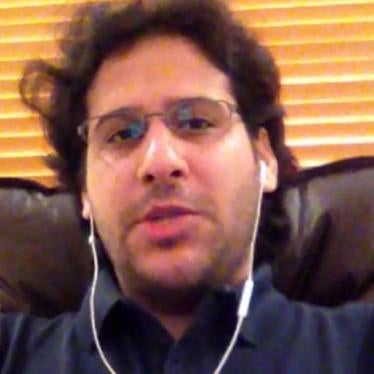(Washington) - United States President Barack Obama should use his meeting on September 25, 2014, with President Abdel Fattah al-Sisi of Egypt to publicly criticize Egypt’s continued crackdown on basic freedoms, including those crucial to democracy.
Obama is scheduled to meet with al-Sisi during the Egyptian president’s inaugural visit to the United Nations General Assembly. Al-Sisi has already asked Obama for more assistance – including military hardware – to combat terrorism in the Middle East, but Obama should press concerns about Egypt’s human rights abuses, including the widespread jailing of political opponents, mass death sentences, and lack of accountability for the killing of more than 1,000 protesters by security forces in July and August 2013, Human Rights Watch said. Human Rights Watch raised these concerns in a letter to Secretary of State John Kerry on March 31.
“President Obama shouldn’t let al-Sisi’s first visit to the UN look like a return to business as usual,” said Sarah Leah Whitson, Middle East and North Africa director. “Egypt’s authorities have gotten away with crushing dissent by lethal force, and they are betting that invoking terrorism as an excuse will make the US look the other way.”
Since the March 31 letter, Egypt has made no real effort to lift harsh restrictions on freedom of expression, association, and peaceful assembly, while the Obama administration has confirmed that it will nevertheless approve the transfer of 10 AH-64 Apache attack helicopters Egypt to support “counterterrorism efforts,” a decision Human Rights Watch opposes.
Al-Sisi, in statements on September 23 to the Wall Street Journal, said he will support the US war against Islamic State fighters in Iraq and Syria and called on Obama to widen his campaign.
Egyptian authorities have, by their own count, detained 22,000 people since the July 2013 military-backed ouster of the democratically elected president, Mohamed Morsy. The broad arrest sweep has caught up many people who were peacefully expressing political opposition to Morsy’s overthrow and to the al-Sisi government. The actual number of arrests is probably higher.
Sources in al-Sisi’s government have told the media that they intend to amend a draconian anti-protest law, passed by the previous, military-backed interim government of President Adly Mansour. The law effectively gives the authorities power to ban and break up any public demonstration, but they have made no substantive effort to amend it.
Similarly, the Social Solidarity Ministry recently postponed, but has not abandoned, a deadline for all nongovernmental organizations to register under a highly restrictive 2002 law. Further, al-Sisi’s administration is still contemplating a new law that would effectively put nongovernmental organizations under the control of the security services.
The security forces’ crackdown has mostly targeted political opponents associated with the Muslim Brotherhood, but has extended to secular activists as well. While the courts recently released the prominent activist Alaa Abdel Fattah on bail and suspended the human rights campaigner Mahienour al-Masry’s sentence for violating the protest law, Abdel Fattah and many others still face charges of illegal protest.
Thousands of other Egyptians, including Brotherhood members and other Morsy supporters, are in jails, prisons and police stations, subject to repeated pretrial detention orders based on little, if any, evidence. There are credible accounts that a large number of detainees are being held incommunicado in military facilities, and that dozens have died in custody under circumstances of mistreatment or negligence that warrant investigation.
“Obama should seize the opportunity to send a clear message to al-Sisi but also to Egypt’s independent organizations, that the US is a true friend of Egypt and Egyptians not just of the current sitting strongman,” Whitson said.







